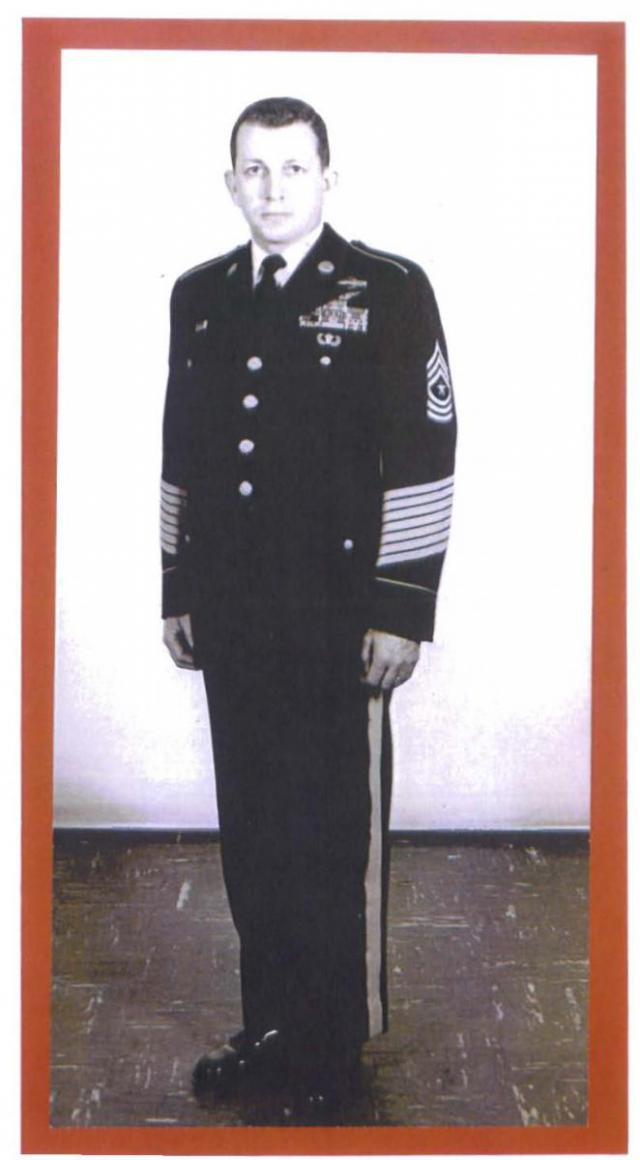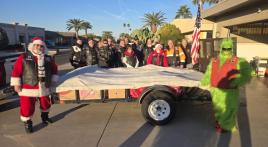There are still some of them out there. Unfortunately, few of us know who they are and what they did until they are gone. And they are not about to tell us for some unknown reason, but more about that later.
My recently deceased brother-in-law was one. He fought in three different wars and was wounded in each of them. I often wondered how many veterans could say that. If you are an IT type, go ahead and Google it. We tried and the answer was “information not available.” I’m betting the number of old warriors still living who won Purple Hearts in World War II, Korea and Vietnam could be counted on one’s fingers. Maybe on one hand! And now I guess we will never know for sure.
Neighbors living on the north side of Columbus, Neb., may have thought it odd to see this little old guy down on his hands and knees (I’m not kidding), trimming around the edges of his lawn with a scissors after he’d mowed it. A few of us knew it was not a matter of his being obsessed with having the best yard in the neighborhood.
Old habits are hard to break. This one likely formed during a 27-year career in the Army, ending with being the first command sergeant major of the Aviation Battalion, 82nd Airborne Division. If you had spent that much of your adult life in an environment where shoes did not just shine – they had better “gleam” - or when a coin flipped on the top cover of a newly made bunk had damn well better bounce at least a little, you might understand.
Curious drivers on 38th Avenue probably slowed down a little when they saw his morning ritual of literally marching the flag out to the front of his house, running it up and saluting, then reversing the process every evening.
He did this for the last time, ironically, last Memorial Day, then drove himself to the hospital that night. Memorial Day is of course when we are all supposed to think about soldiers, young and old, here and gone, who fulfilled some military duty. Most of us do – but I’m afraid an increasing number do not.
His family shared a little chuckle that he drove himself because he’d had enough of riding in ambulances. We also suspected he rarely told anyone of having been a paratrooper because he hated the old joke about people being dumb enough to jump out of perfectly good airplanes
Sgt. Maj. Carroll Laudenklos then died on June 6, D-Day. How ironic. That day also happened to be the 66th wedding anniversary for him and his wife, Mary Ann.
Famed newsman Tom Brokaw, in his fine book “The Greatest Generation,” made one point over and over. When these old World War II types made a commitment, take it to the bank! They would keep it.
Even more ironic, on the day Carroll died, a delegation from his hometown was in France at Normandy, helping dedicate a memorial on the beaches where so many had fallen 70 years before. Columbus is also the hometown of Andrew Jackson Higgins, the inventor of the landing craft that bore his name and helped win the war.
About a month before he died, Carroll gave me a book describing the mood in America in early l942. Few of us today can even begin to understand the gloom. If Las Vegas had been laying odds back then on who would win the war we were suddenly in, it may well have been “even money.”
Hitler had assembled a mighty war machine that was running roughshod over Europe, including Russia. Japan also seemed invincible, taking hunks of Asia, including China, the Philippines and other strategic islands in the Pacific. Of course we all know (I hope) about Pearl Harbor, where we were hurt even worse than the Japanese realized, and then Germany and its Axis allies declared war on us a few days later.
Imagine the somber mood in Washington, D.C. Our military was sparse, with the Army essentially in “mothballs.” After all, the previous world war was known as “The War To End All Wars.” Pres. Roosevelt was told by advisers that we could become an industrial juggernaut, but it would take awhile. Our products at the time were Fords, Chevys, John Deeres and washing machines. Converting all that over to making warplanes, battleships, artillery and hand grenades would not be easy or fast. The timing necessary for that, plus assembling and training vast numbers of armed forces would be close, they said. The eventual outcome was surely in doubt, but very few of us knew that.
In that book, it actually documented one of our early, local “war efforts” was putting Midwestern farm boys out in the fields to collect mature milk-weed pods. The seeds were then used in life jackets for our sailors sunk by German submarines! Think about that - our first defense against the dreaded U-boats involved milk-weeds. But then, many miracles began to take shape. America had been badly underestimated.
Pictures of a glowering Uncle Sam started appearing everywhere, pointing his index finger and saying “I Want You!” Over ten million people stepped up, ready to do their duty even though they really had no clue what that might eventually be. That included 300,000 women who took various military jobs, including many nurses. Over three million women began replacing departing men in the fields and factories, becoming the famous “Rosie The Riveter”.
Patriotism raged, and like never before, or since, no one needed to think twice about what the “U” in U.S. stood for.
By l944, high school student Carroll Laudenklos, in little Platte Center, Nebr., decided the rest of his education would have to wait. Answering the call seemed a higher priority, so he quit, and enlisted in the Army. After training, he was shipped directly to France and strangely enough, his movements that first year remain largely a mystery, even to his family.
We do know that nearing the end of the war, in April of l945, his unit was helping liberate the Dachau Concentration Camp in Germany. PFC Laudenklos was injured by an explosive booby trap and spent much of the rest of the war hospitalized in Belgium.
He then tried civilian life, but decided the Army might still need him someday and went back in. Then came Korea.
He was now a First Sergeant and one day his jeep drove over a land mine. The driver was killed. His colonel was critically wounded with a broken back, and Sgt. Laudenklos was injured in an area of his anatomy he would never discuss. Then came another month in a hospital and another Purple Heart.
There were a couple of things about Korea he surprisingly would discuss. He said you don’t know cold unless you have experienced “Korea Cold”. He said if they gave Purple Hearts for frostbitten ears, fingers and toes, everyone would have had one.
Also he, and I assume most other Korea vets, got a little heartburn when he heard the whole Korean action described as a “conflict”. That word suggests a struggle, or “disagreement”. With over 40,000 of our own killed this was a hell of a lot more than that. He reasoned when uniformed armed forces fight and die, call it what it is – a war!
Finally, came Vietnam. He was now a Sergeant Major of an airborne unit, had just completed a l3 month combat tour and was in his tent packing to return stateside the next day.
A mortar attack erupted and Carroll suffered shrapnel wounds to his arm and chest. More Army hospitals followed, first in Japan and then Fitzsimmons in Colorado. After healing, he decided maybe three Purple Hearts were enough and retired in l970. So now, most of the unknown details about this military career will remain unknown forever.
As Brokaw said so well near the end of his book, “they didn’t want pity and they did want to forget, especially those who had been in combat. When they couldn’t erase the war from memory they simply confined it there, refusing to talk about it unless questioned, and then only reluctantly”.
One thing Carroll did express concern about was that our wars seem to become ever more “political”. By that, I think he meant they had all felt the love, coming home victorious in l945. From Korea, not so much – but not bad. However, Korea soon came to be considered by many as “the forgotten war”, and that hurt. Then came Vietnam, and that hurt was even worse.
Carroll and his wife had one son, Larry, also now deceased and also an Army veteran of Vietnam. He served in a helicopter Medevac unit.
I believe most thinking people still agree that what many Vietnam vets experienced when they came home was nothing short of shameful. It was bad enough to not receive the gratitude and respect they had earned, but to be called “baby killers”, or worse, insulted and spat upon, was despicable! They had put their lives on the line, did their duty, and to this day many carry scars that will never heal.
Carroll was happy that veterans now seem to be back to getting some appreciation for their efforts, even though our country still is not, and may never be, as united as we were when he enlisted the first time. Today, when it comes to military actions, maybe one-third of us say “do more”, another third says “do less, or nothing”, and the final third has no interest whatever. What are people putting their lives on the line supposed to make of a support system like that?
We sometimes discussed military tactics and objectives (I am an old jarhead Marine). When we disagreed, I was always at a disadvantage, however, having never heard a “shot fired in anger.”
Like most everyone else, we have been confused and confounded by terrorism and recognized our whole universe shifted on 9/ll/0l. This enemy does not wear recognizable uniforms, and may not even all be adult males. They have unlimited recruiting opportunities with social media, are suicidal, and able to kill l3 of our soldiers at Ft. Hood, and now recently five recruiters in Tennessee, targeted only because they wore our uniform!
Not surprisingly, we did agree that throughout history, the foot soldier has always been, and most likely will forever be, indispensable.
We will likely always have enough high-tech hardware to deliver bombs, missiles or drones, surgically destroying enemies from a relatively safe distance. But in the end, to secure and then maintain that status, we’ll need the presence of people with shoulder-fired weapons.
The term has been used to the point of becoming a cliché, “boots on the ground.” We will probably always have enemies, so we can only hope, but never assume, that we have enough brave young people to fill those boots as CSM(ret) Carroll R. Laudenklos did. But sometimes you can’t help but wonder, and worry.

Heroes among us
Monroe, NE
December 6, 2015
Submitted by:
Lee Rupp


